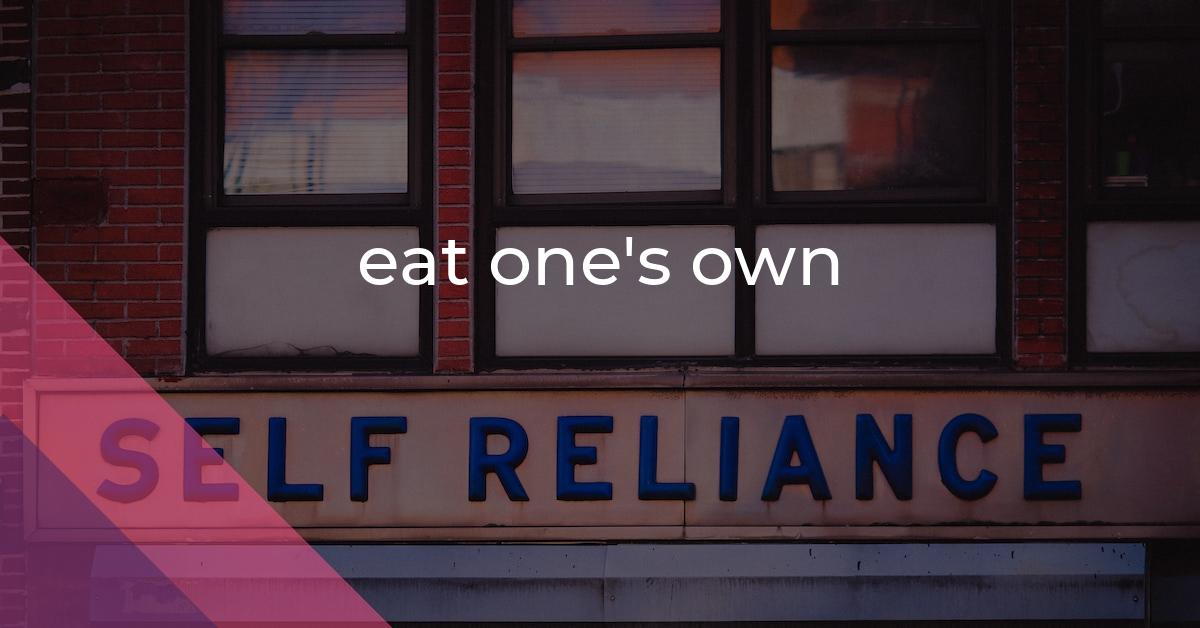eat one’s own: Idiom Meaning and Origin
What does ‘eat one's own’ mean?
The idiom "eat one's own" means to act selfishly or prioritize one's own needs or interests above others, often to the detriment of others or the overall goal.

Idiom Explorer
The idiom "look out for number one" means to prioritize oneself and one's own interests above all others. It implies a selfishness or self-centeredness, often at the expense of others.
The idiom "have one's way" means to get what one wants or to have things done according to one's own preference, often by exerting control or influence over others.
The idiom "have one's cake and eat it too" means wanting to have the benefits of two conflicting choices without making a sacrifice or compromise.
The idiom "go one's own way" means to make independent choices or decisions, without being influenced by others or conforming to societal expectations.
The idiom "for one's particular" means to do something specifically for oneself or to meet one's personal needs or preferences.
The idiom "fill one's face" means to eat a large amount of food quickly and greedily.
"Eat one's own dog food" means to use or consume one's own products or services to demonstrate confidence in their quality or to understand their flaws. This idiom originates from the dog food industry's practice of testing their products by feeding them to their own dogs.
The idiom "eat one's heart out" means to feel intense sadness or jealousy over someone else's success or happiness.
The idiom "eat one's head off" means to consume something excessively or without restraint, often referring to a person or an animal consuming food in large quantities. It emphasizes the idea of extreme or voracious eating.
The idiom "eat one's hat" means to be absolutely certain about something, even if it seems unlikely, and be willing to take drastic measures to prove it.
Cannibalistic Conundrum
The idiom "eat one's young" is a related phrase that is often used to describe a parent who harms or neglects their own children. This expression highlights a particularly cruel form of betrayal, where a parent fails to protect and nurture their own offspring. It is a tragic and disturbing concept that emphasizes the idea of turning against one's own blood.
Similarly, the idiom "eat one's feelings" is another related expression that is used to describe the act of using food as a form of emotional comfort. When someone "eats their feelings," they are seeking solace or relief from negative emotions by consuming food. This behavior is often driven by stress, sadness, or other emotional distress, and can be seen as a way of temporarily numbing or distracting oneself from their feelings.
Both of these related idioms reflect different aspects of the broader concept of "eating one's own." While "eat one's young" focuses on the betrayal within a familial or parental relationship, "eat one's feelings" delves into the realm of emotional coping mechanisms. These idioms highlight the range of situations where the act of "eating one's own" can occur, revealing the complexity and depth of the overarching theme.
When we consider the metaphorical meaning of "eat one's own," it becomes evident that this idiom encapsulates the themes of betrayal, self-destruction, and harm within various contexts. Whether it is a parent harming their own children, a person consuming food as a means of emotional comfort, or individuals turning against their own group or team, the fundamental idea behind "eating one's own" remains consistent.
An example of the idiom "eat one's own" in action can be seen in the realm of politics. In this context, a politician who publicly criticizes their own party or colleagues is figuratively "eating their own." By betraying and undermining their own team, they are contributing to their party's downfall and damaging the collective goals and ideals they once stood for.
In the world of sports, the phrase "eat one's own" can be applied to a player who sabotages their teammates or undermines the unity of the team. By indulging in personal ambitions or engaging in behavior that is harmful to the collective success of the team, they are metaphorically devouring their own. This act of self-sabotage not only harms the player but also undermines the trust and cooperation within the team.
In personal relationships, the idiom "eat one's own" manifests itself in situations where a family member turns against their own kin. Whether it is a sibling betraying another sibling's trust or a parent neglecting their child's well-being, these acts of betrayal reflect the darker side of human nature. By choosing to harm or neglect their own family, individuals are essentially "eating their own," causing irreparable damage to the bonds of trust and love that should exist within a family unit.
It is important to note the destructive nature of "eating one's own" in these examples. The act of betrayal or self-destruction not only harms those directly involved but also has broader consequences. Whether it is the downfall of a political party, the disintegration of a sports team, or the fracture of a family, the repercussions of "eating one's own" are far-reaching and often devastating.
The idiom "eat one's own" serves as a powerful reminder of the importance of loyalty, unity, and empathy within a group or team. It cautions against the dangers of turning against one's own and emphasizes the need for accountability and responsibility in our actions. By avoiding the destructive path of "eating one's own," we can strive for self-sufficiency, self-reliance, and independence while fostering stronger and more harmonious relationships within our communities.
The idiom "eat one's own" is a vivid and poignant expression that carries a weighty metaphorical meaning. It encompasses a range of situations where betrayal, self-destruction, or harm is inflicted upon one's own group or team. The related idioms "eat one's young" and "eat one's feelings" further illuminate the multifaceted nature of this concept. Whether it is a parent harming their own children or a person seeking solace in food, "eating one's own" exposes the darker sides of human nature and calls for introspection and change. By recognizing the destructive nature of this behavior, we can strive to build stronger, more compassionate communities and relationships based on trust, loyalty, and empathy.
Example usage
Examples of how the idiom "eat one's own" can be used in a sentence are:
- He was so hungry, he decided to eat his own sandwich instead of waiting for the restaurant to bring his order.
- Even though she was mad at her friend, she couldn't resist eating her own words and apologizing for her harsh comments.
- The politician's scandal caused him to eat his own words when he had to publicly retract his previous statements.
The idiom "eat one's own" can be used to express the act of consuming something that belongs to oneself or retracting one's own previous statements or opinions.
More "Cannibalism" idioms



